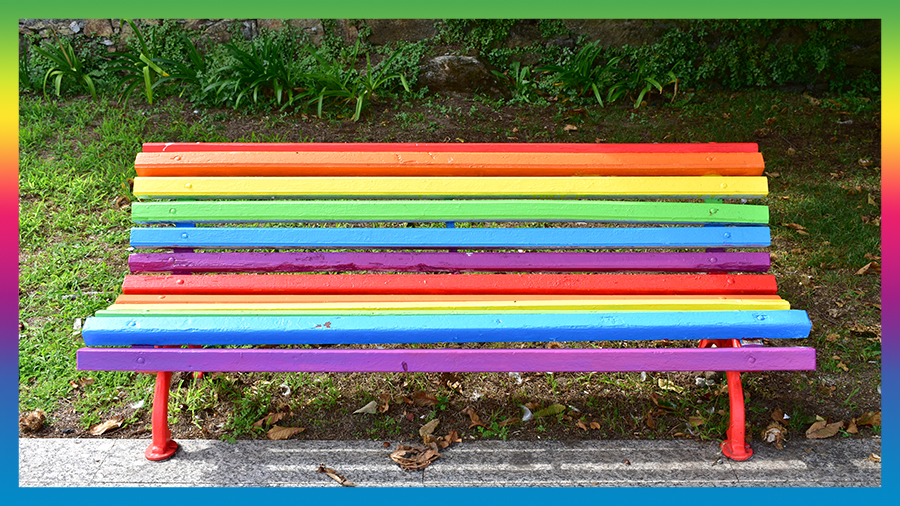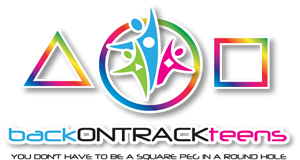
20 Oct Taz’s story: Her sexual identity around 13 years old
Hey – thanks for having us on your screen. Welcome to the Back on Track Teens blog for young people and those young at heart.
You’ve loaded a blog article that’s part of a mini-series about gender and sexual identity*. The mini-series shares 11 wonderful and inspiring stories from young people who identify as LGBTQ+. Feel free to read on but you may want to pause and have a quick scan of the opening article to give a bit of context around the collection of stories and resources available. Please click here to read the first article.
“I knew I was different from the people around me but not that it mattered” – Taz
Continuing the Back on Track Teens mini-series about gender and sexual identity, we speak to Taz who identifies as a bisexual woman. Taz discusses discovering her own identity and shares what it’s like being director of volunteering for the charity Just Like Us.
Taz believes we are brought up to make binary choices. The work of people who have a voice going into schools and speaking about their experiences helps to start conversations that give insight into the world of the LGBTQ+ community.
Taz’s story
Name: Taz
Age: Early 20s
Pronouns: She/her
Sexual identity: Bisexual
Occupation: Director of Volunteering at Just Like Us charity
“I realised around 13 years old – I am bisexual. [It was] no big revelation. All that happened was that I recognised who I was fancying. Celebrities weren’t just men.”
Taz is British Bangladeshi and attended a London school in the early 2000s. Her school was ethnically diverse but there wasn’t much visibility in people identifying as LGBTQ+. She believes that it is important for people to hear stories about being LGBTQ+ or existing beyond the gender binary that aren’t tragedies, which is quite often what we see portrayed.
What was it like to ‘come out’?
“I was lucky that my school cared about anti-bullying in all its forms. I was in a friendship group who weren’t really knowledgeable [about LGBTQ+] but were very chilled people. I knew I was different from the people around me but not that it mattered. I wasn’t looking to find other people at that time, but I know that’s not the case for everyone. People need to know they are in an accepting environment.”
For clarity, and to give people a quick answer, Taz says she tells people that she’s bisexual even though she personally doesn’t feel the need to identify with a certain label.
“The label itself doesn’t form a central part of my identity but being LGBTQ+ has led me to care about it more because I’m closer to the experience of it.”
Taz feels that labels can be important to people to help figure out who they are, but others may not feel like they need a label – and both are completely OK.
Just Like Us Charity
Taz’s role at Just Like Us is to oversee 300 volunteers and coordinate young adults across the UK. She joined the charity in 2018, when it was small and aspiring to reach people – now it has reached over three million young people.
“There’s such a huge job to do in raising positive visibility of LGBTQ+ in schools [and helping young people] to connect and relate to more people around them. It’s really exciting to be in a massive community of LGBTQ+ doing great things.”
In her role at Just Like Us, Taz is helping to get more diverse representation of LGBTQ+ people in schools and in front of other people. She explains that young people aren’t just looking for success stories along the lines of, ‘I was bullied and now I’m a CEO.’
“We think there is a gap of people who are recent school leavers…people who are just a little bit older [than current school students]. Our volunteers are called Ambassadors.”
Ambassadors are 18-25 years old and trained by Just Like Us to speak in schools about what LGBTQ+ is, what their personal experiences are, and how anyone can be an ally – not just people who identify as LGBTQ+. Volunteers hold talks, interactive workshops and encourage pupils to get involved in a range of things to make the lives of people who identify as LGBTQ+ better.
The work carried out by Just Like Us helps to increase representation. Taz has seen firsthand how having someone come into schools and talk about their experience and how to be a good ally can have such a positive impact. Sharing information and creating learning opportunities produces a better atmosphere in schools and well-rounded, knowledgeable children and adults, who are respectful of other people and recognise that all love is valid.
“Non LGBTQ+ students ask about how they can be better allies and prevent bullying. It’s really heartening. [People] expect to get a hostile reception but it’s quite the opposite. Anyone who’s openminded wants to know more, understand and help. Positive presence in a room is powerful.”
Taz feels that bullying stems from a lack of understanding and if more interventions can be made in schools, knowledge can be passed up the ladder thereby helping to reduce ignorance. She explains that most people don’t have the time to study topics that don’t immediately affect them and when people don’t personally have a connection to the LGBTQ+ community, they may never feel the need to learn.
“People are terrified of talking about it in the wrong way. Staff members are grateful for us because they fear not being able to talk about it correctly. It can be intimidating but we just talk about experiences.”
What are the common questions asked from students?
Taz explains that students often approach Just Like Us ambassadors to ask whether you can be LGBTQ+ and another identity, such as being disabled, a person of faith, or a person of colour.
“The answer is yes, you can be all those things. We are insistent on making the case for that. We’ve come across the viewpoint that you can’t be those things at the same time. It’s like someone is going to stop you.”
Other common questions are when is the right time to come out as LGBTQ+ and who should be told? Because everyone’s experience will be different, the only answer to those questions is that it’s up to the individual. Taz says that as long as you feel safe and tell someone who you know will support you, be that friends, family or teachers. Everyone’s experience is different and coming out as LGBTQ+ is often a continual process.
“To know that whatever you are is what you are. There’s not a question of can – it just is. Everyone has the power within them to build an environment for themselves.”
Current challenges around mental health and LGBTQ+
Recent statistics report that around half of the students surveyed say they had little to zero positive messaging about being LGBTQ+ in school over the last year. Upsettingly, LGBTQ+ young people are more than twice as likely to be worried about their mental health on a daily basis. If they are black, disabled or on free school meals and part of the LGBTQ+ community, they face even more challenges.
“… [LGBTQ+ people] live in a world where they are less understood and visible. They do experience higher levels of bullying and rates of mental health. They likely feel more isolated. In schools with positive messaging, mental health is improved for LGBTQ+ and all people in schools. Our research shows it. It has knock-on effects in other areas of life.
In my experience, realising I was LGBTQ+ I felt isolated and angry in my homelife, but feeling accepted at school was such an important thing for me.”
Having increased representation on TV and in films is helpful, but to have awareness in schools of real-life experiences is beneficial to all young people.
What resources are out there to help people learn more?
“Googling something is not the same as talking to someone in real life. You don’t come to accept people as much or feel as comfortable when it’s just in theory. Flesh and bones instead of something written on screen.”
School Diversity Week, which took place during 21-25 June 2021 is a big event for Just Like Us. In 2021, the charity and its ambassadors and employees organised and supported schools to hold LGBTQ+ lessons and assemblies, promoted rainbow-themed pictures, bake sales, and provided online masterclasses.
“It was such a great week [for] positivity coming out of schools. We saw how inside and outside of school, subjects on LGBTQ+ are relevant – we’re not just talking about it relating to sex and relationship education. Over 2.8 million people were represented and got involved.”
Taz explains that celebrating the diversity of role models, including writers, scientists and sports people throughout history is important because you can’t always identify an LGBTQ+ person in quite the same way as, for example, people of colour because they are more easily visible.
How can sex education be improved in schools?
LGBTQ+ representation is important for understanding and normalising sexuality and gender identity.
Taz talks about training school staff to run Pride groups as a great way for schools to support and provide for the LGBTQ+ community and allies. Groups led by staff and students held in lunchtime breaks or online to talk about identities, history and culture can help with campaigns to provide support in the community.
Increasing visibility by having posters and leaflets about LGBTQ+ frequently asked questions or promoting support groups can improve the positive representation of schools championing inclusion.
Taz says a great place for schools to start is to look at policies and procedures for supporting LGBTQ+ students. Supporting LGBTQ+ at a policy level will ensure safe places and sponsors for students to approach. Having gender-neutral policies protect students who may identify as something other than cisgender and it’s a sign that schools care about the wellbeing of all students.
Just Like Us has a Facebook group for educators who want to champion LGBTQ+ in schools. Members have a safe place to air questions and concerns and find out about best practice in LGBTQ+ inclusion in schools.
How can people get involved in Just Like Us?
There are several ways to get involved with the charity. As a volunteer, there is an ambassador programme available for people aged 18-25 years old and for anyone above 25 years old, a mentoring programme to mentor ambassadors in chosen careers is an option.
For educators and school staff, there is an abundance of information available on the Just Like Us website to help increase visibility in schools through educational resources and ideas for activities and learning.
Listen to Taz's story
Choose the life you want to lead
Educating people from an early age and making support groups and organisations accessible will increase the representation and visibility of LGBTQ+ communities. Listen to other real-life stories like Taz’s on the Spark To Your Success podcast or read more on the blog.
Please share your experiences and with us on social media or comment below.
The more we can raise awareness and increase inclusion, the quicker all sexual and gender identities will become normalised.
“Openness may not completely disarm prejudice, but it’s a good place to start.” Jason Collins
Thanks for reading…
Creating the gender and sexual identity mini-series has been an incredible experience for the Back on Track Teens team.
- I encourage you to go ahead and download our free eBook, which brings the interviews together with a huge collection of information, resources and inspiration.
- Subscribe to the Spark to Your Success podcast here.
- Access insightful stories, helpful exercises and more resources on our blog.
- Refer to the Back on Track Teens LGBTQ+ glossary here.
- Order ‘The Spark to Your Success – Helping Teens Build Resilience’ here.
- Order ‘The Spark to Your Success – Mindset Magic for Teens’ here.
Are you a parent or caregiver of a young person who may be experiencing challenges around gender and/or sexual identity? Book a session with TeeJay Dowe
Work at a school or organisation and want to know more? Book an awareness training session
*The blog articles capture real stories and the topic of conversation is frank. Its purpose is to elevate the voices of people within the LGBTQ+ community, answer questions, provide resources, and offer support.


No Comments